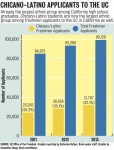The original graphic accompanying this article contained an error and has been changed. See the bottom of the article for additional information.
Students of Chicano-Latino descent are now the largest ethnic group of freshman applicants applying to the University of California system because of increased high school graduation rates and expanding financial aid opportunities.
Asian Americans comprised the largest ethnic group of applicants to the UC systems in 2012. But the number of Chicano-Latino freshman applicants grew by a total of 2 percent to 32.1 percent from 2012 to 2013, making them the largest ethnic group applying to the UC system, according to data released by the UC Office of the President last month.
The increase in applications, however, does not necessarily translate to the number of admitted students in the upcoming school year, said Dianne Klein, a UC spokeswoman. Admission decisions for UCLA will be available beginning in mid-to-late March.
Klein said there are two main reasons behind the increase in the number of Chicano-Latino applicants for the most recent application cycle. One reason is that there are increasingly more Chicano-Latino students graduating from high schools.
The Chicano-Latino population is the second-largest ethnic group within California – with non-Hispanic whites as the largest – constituting about 38 percent of the total population, according to data from the 2010 U.S. Census.
The high school graduation rate of Chicano-Latino students increased by 2.2 percent from 2010 to 2011, the second-biggest jump out of all ethnic groups recorded, according to the California Department of Education website.
Latino students are also better prepared for college than before, and tend to meet the A-G requirements, Klein said. These requirements include core courses – such as taking two years of history/social science classes – high school students must complete before applying to a school in the UC system.
The UC system has outreach programs at local underperforming high schools, which may increase the accessibility of high school students to the UC and contribute to the trend, Klein said.
María Cristina Pons, vice chair of Chicana/o studies at UCLA, said finances could be another reason for the growth in Latino applicants to the UC.
“Many students don’t see the possibility to pay (for college) unless they have something to hold on to,” Pons said.
Affordability played a large role in determining whether some Chicano-Latino students applied to or enrolled in the UC system, said Magda Yamamoto, an academic counselor for International and Area Studies Interdepartmental Programs at UCLA.
“I had a student whom we offered a fellowship to three years ago but she could not attend because of financial reasons,” Yamamoto said. “It was disheartening.”
But for students whose families earn less than $80,000 a year, the UC offers a Blue and Gold Opportunity Plan to fund their education.
Some students said they considered the possibility of attending a school in the UC system based on scholarships and financial aid.
“The financial part was definitely a factor (in applying to UCLA),” said Nathaly Fernandez, a fourth-year Chicana/o studies student. “It made me a lot more motivated to attend a UC school.”
Despite the incentives of financial aid, some students said they were not concerned with the costs, and applied to the UC system for the opportunity.
“Without the financial aid, it would have definitely been a challenge,” said Evelin Pineda, a third-year Spanish and linguistics student.
Pineda said she is a first-generation college student whose parents immigrated to the United States from Mexico. She was offered the Chancellor’s Blue and Gold Scholarship at UCLA, a scholarship offered to recognize the academic achievement of first-year students attending Los Angeles County high schools, according to their website.
“But even if I didn’t get the scholarship, I would have still come to UCLA for the opportunity it offers,” she added.
The California Dream Act of 2011 allows undocumented students who have lived in California, attended a California high school for three or more years and have graduated from a California high school to apply for state-funded financial aid benefits at institutions such as the UC, California State University and California community colleges.
“(The Dream Act) gave more possibilities to allow students to apply for financial aid,” Pons said.
Before the Dream Act was passed, she said undocumented students did not even think about applying to the UC system. because they would not be covered financially.
Correction: Chicano-Latino students are now the largest ethnic group among freshman applicants to the UC.
